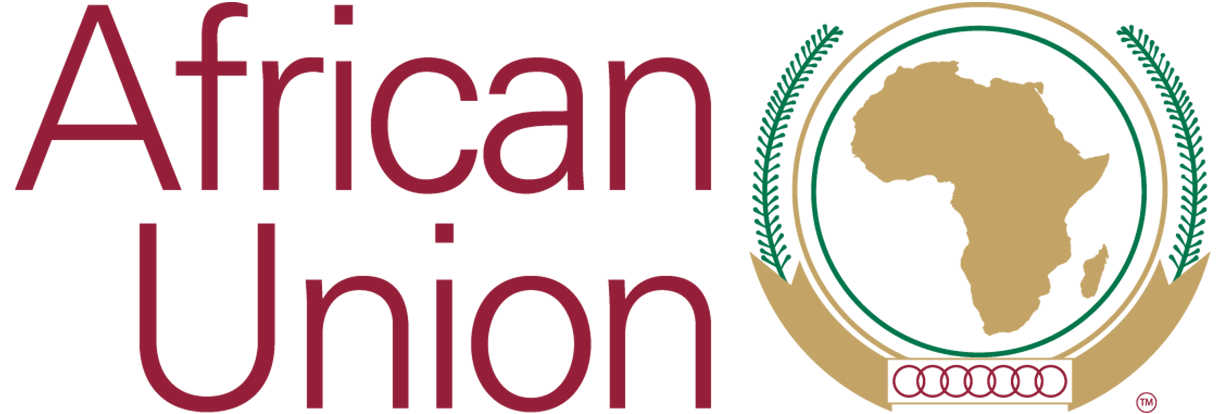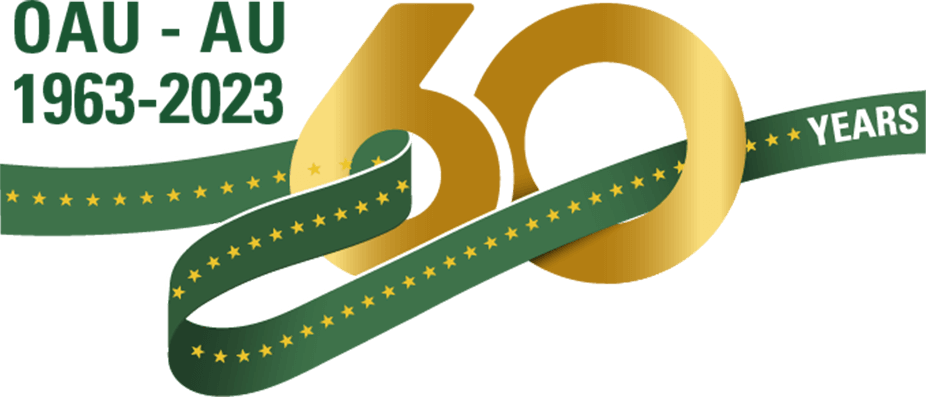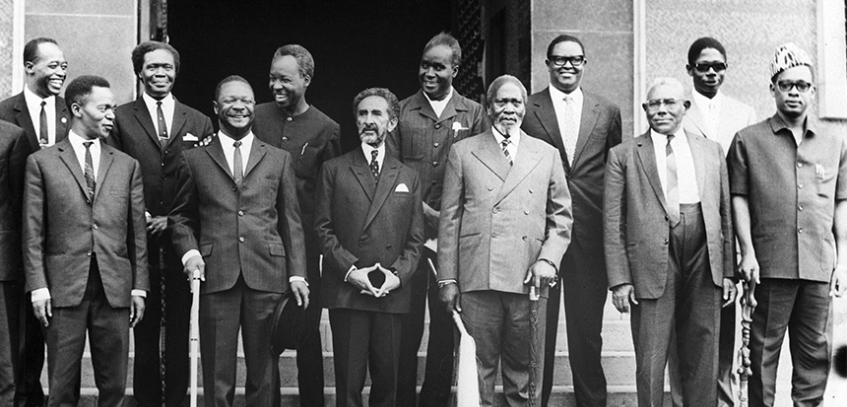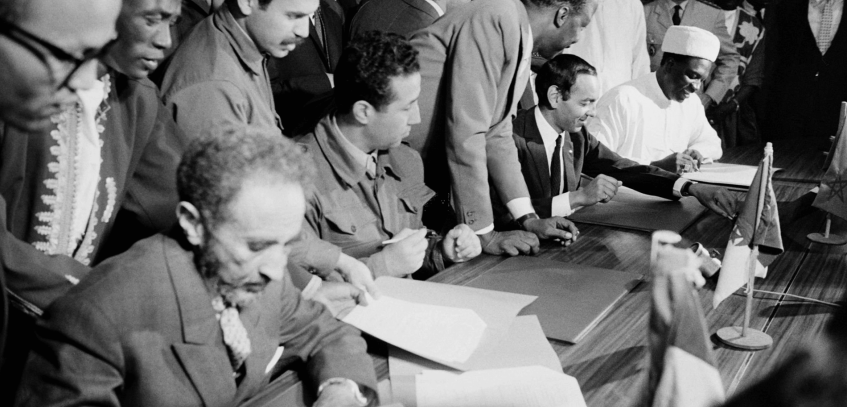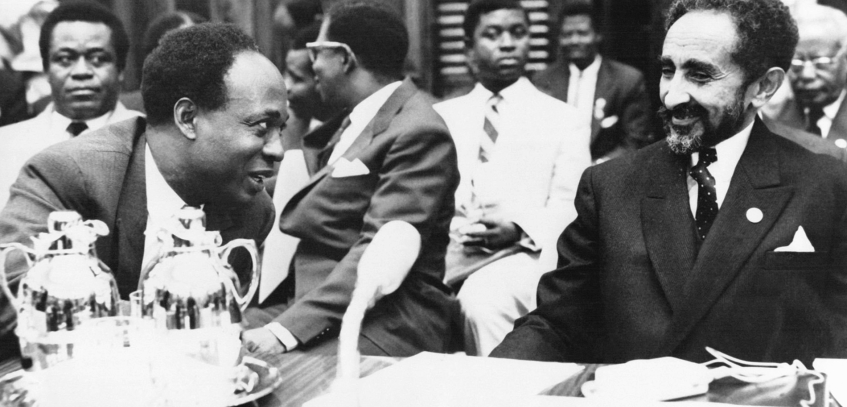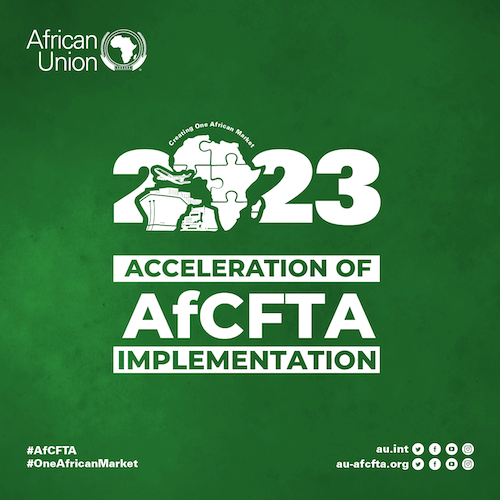Founding Fathers
The year 2023 marks 60 years since the formation of the Organization of the African Unity (OAU) on 25 May 1963. The OAU later relaunched into the African Union in 2002. In celebrating 60 years of the continental organization, the African Union invites all African citizenry on the continent and in the diaspora to join in commemorative activities that reflect on the spirit of pan-Africanism that determined the actions of our forebearers and connects the past to the present and our aspirations for the future of all people of African descent and for our motherland Africa #OurAfricaOurFuture.
Our history -Founding Fathers
For the longest time the narrative has been told from the colonial perspective. Experience it first hand as it told by those who are the custodians of the vision of Africa and making it work for its present and future generations through telling the story of inception to rebirth.
A continent rich in its ethnic identity and diversity tells the world of where it is going and why it matters that world stands in awe an experience this first hand.
These stories told by our founding fathers are about the how Africans formed a continental body known as the Organization of African Unity (OAU) to fight for liberation and bring the Pan-African ideas to reality.
- Alh. Sir Abubakar Tafewa Balewa , 1st and only Prime Minister of Nigeria
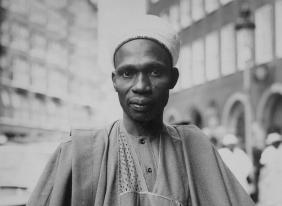
Alh. Sir Abubakar Tafawa Balewa, (December 1912 – 15 January 1966) was a Nigerian politician who was the first and only Prime Minister of Nigeria. He was an important leader in the formation of the Organization of African Unity and creating a cooperative relationship with French speaking African countries. He was also instrumental in negotiations between Moise Tshombe and the Congolese authorities during the Congo Crisis of 1960–1964
- Dr. Kwame Nkrumah, 1st President of Ghana
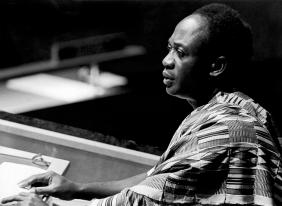
Kwame Nkrumah (21 September 1909 – 27 April 1972) was a Ghanaian politician and revolutionary. He was the first Prime Minister and President of Ghana, having led the Gold Coast to independence from Britain in 1957. An influential advocate of Pan-Africanism, Nkrumah was a founding member of the Organization of African Unity and winner of the Lenin Peace Prize from the Soviet Union in 1962.
- His Majesty Haile Selassie, Emperor of Ethiopia
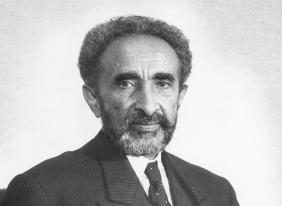
His Majesty Haile Selassie
His Majesty Haile Selassie I born Ras Tafari Makonnen; 23 July 1892 – 27 August 1975) was the Emperor of Ethiopia from 1930 to 1974. His internationalist views led to Ethiopia becoming a charter member of the United Nations. In 1963, he presided over the formation of the Organization of African Unity, the precursor of the African Union, and served as its first chairman.
- General Gamage Abdul Nasser, 2nd President of Egypt
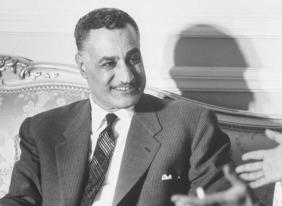
General Gamage Abdul Nasser
Gamal Abdel Nasser Hussein (15 January 1918 – 28 September 1970) was an Egyptian politician who served as the second President of Egypt from 1954 until his death in 1970.Nasser remains an iconic figure in the Arab world, particularly for his strides towards social justice and Arab unity, modernization policies and anti-imperialist efforts. His presidency also encouraged and coincided with an Egyptian cultural boom and launched large industrial projects, including the Aswan Dam and Helwan city.
- H.E Ben Bella, 1st Algeria's 1st President of Algeria
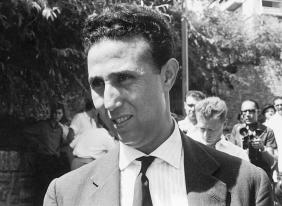
H.E Ben Bella
Ben Bella, Ahmed 1919–2012, Algerian statesman. After World War II he joined the Algerian nationalist movement and soon became a leader of its underground paramilitary faction. He later (1952–56) served as director of the movement. Imprisoned (1956–62) for his activities, he became Algeria's first premier after independence was declared in 1962 and was elected president in 1963.
- H.E Abdirashid Ali Sharmarke, 2nd President of Somali Republic
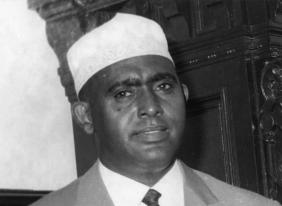
H.E Abdirashid Ali Sharmarke
His Excellency Abdirashid Ali Sharmarke, was Prime Minister of Somali Republic from July 12, 1960, to June 14, 1964, and President of Somali Republic from July 6, 1967, until his assassination on October 15, 1969.
- H.E Apollo Milton Obote, Prime Minister of Uganda
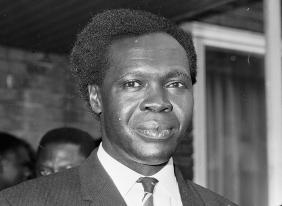
H.E Apollo Milton Obote
Apollo Milton Obote (28 December 1925 – 10 October 2005) was a Ugandan political leader who led Uganda to independence in 1962 from British colonial administration. Following the nation's independence, he served as Prime Minister of Uganda from 1962 to 1966 and President of Uganda from 1966 to 1971, then again from 1980 to 1985. He was overthrown by Idi Amin in 1971 but was re-elected in 1980 a year after Amin's 1979 overthrow.
- H.E Ahmadou Ahidjo, 1st President of Cameroon
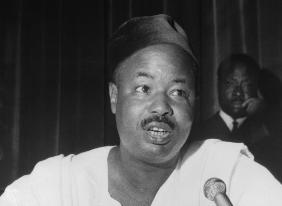
H.E Ahmadou Ahidjo
Ahmadou Babatoura Ahidjo (24 August 1924 – 30 November 1989) was a Cameroonian politician who was the first President of Cameroon, holding the office from 1960 until 1982. Ahidjo played a major role in Cameroon's independence from France as well as reuniting the French and English-speaking parts of the country.
- H.E Sekou Toure, 1st President of Guinea
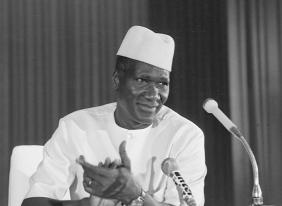
H.E Sekou Toure
Ahmed Sékou Touré (January 9, 1922 – March 26, 1984) was a Guinean political leader and African statesman who became the first President of Guinea, serving from 1958 until his death in 1984. Touré was among the primary Guinean nationalists involved in gaining independence of the country from France.
- H.E Leopold Senghor, 1st President of Senegal
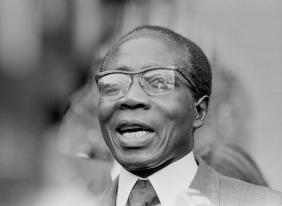
H.E Leopold Senghor
Léopold Sédar Senghor (October 1906 – 20 December 2001) was a Senegalese poet, politician and cultural theorist who, for two decades, served as the first president of Senegal (1960–80). Senghor was the first African elected as a member of the Académie française. He is regarded by many as one of the most important African intellectuals of the 20th century.
- H.E Julius K. Nyerere, President of Tanzania
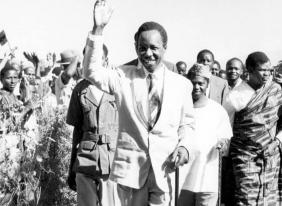
H.E Julius K. Nyerere
Julius Kambarage Nyerere (13 April 1922 – 14 October 1999) was a Tanzanian anti-colonial activist, politician, and political theorist. He governed Tanganyika as Prime Minister from 1961 to 1962 and then as President from 1963 to 1964, after which he led its successor state, Tanzania, as President from 1964 to 1985.
- King Mwami Mwambutsa IV, King of Burundi
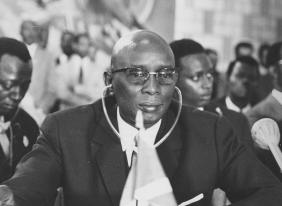
His Majesty King Mwami Mwambutsa IV
His Majesty King Mwami Mwambutsa IV Bangiricenge (6 May 1912 – 26 March 1977) was king (mwami) of Burundi who ruled between 1915 and 1966. He succeeded to the throne on the death of his father Mutaga IV Mbikije (reigned 1908–15). On the independence of Burundi in July 1962, Mwambutsa IV became the head of state of Burundi with far reaching political power
- His Majesty King Idris, King of United Kingdom of Libya
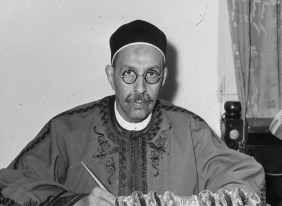
His Majesty King Idris
Prince Muhammad Idris bin Muhammad al-Mahdi as-Senussi; 12 March 1889 – 25 May 1983) was a Libyan political and religious leader who served as the Emir of Cyrenaica and then as the King of United Kingdom of Libya from 1951 to 1969. Under King Idris, Libya found itself within the Western sphere of influence. It became the recipient of Western expertise and aid, and by the end of 1959 it had received over $100 million of aid from the United States, being the single biggest per capita recipient of American aid.
- H.E David Dacko, 1st President of the Central African Republic
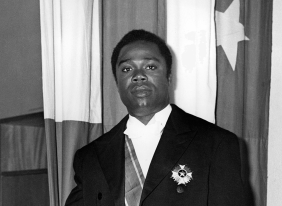
H.E David Dacko
His excellency David Dacko (24 March 1930 – 20 November 2003) was a Central African politician who served as the 1st President of the Central African Republic from 14 August 1960 to 1 January 1966, and 3rd President from 21 September 1979 to 1 September 1981.During his first term as president, Dacko significantly increased diamond production in the Central African Republic by eliminating the monopoly on mining held by concessionary companies and decreeing that any Central African could dig for diamonds.
- H.E U. Modibo Keita, 1st President of Mali
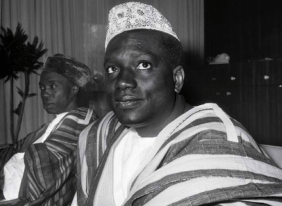
H.E U. Modibo Keita
His excellency Modibo Keïta (4 June 1915 – 16 May 1977) was the first President of Mali (1960–1968) and the Prime Minister of the Mali Federation. Modibo Keïta devoted his entire life to African unity. In 1963, he played an important role in drafting the charter of the Organization of African Unity (OAU).
- H.E Fulbert Youlou, 1st President of The Republic of the Congo
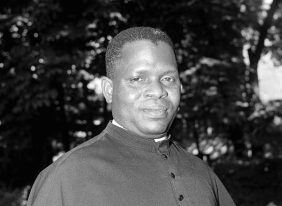
H.E Fulbert Youlou
His excellency Abbé Fulbert Youlou was a laicized Brazzaville-Congolese Roman Catholic priest, nationalist leader and politician, who became the first President of the Republic of the Congo on its independence.
- H.E Hamani Diori, 1st President of the Republic of Niger
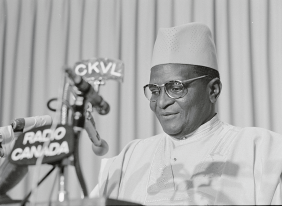
H.E Hamani Diori
His excellency Hamani Diori (6 June 1916 – 23 April 1989) was the first President of the Republic of Niger. He was appointed to that office in 1960, when Niger gained independence. He gained international respect for his role as a spokesman for African affairs and as a popular arbitrator in conflicts.
- His Majesty King Hassan II, King of Morocco from 1961-1999
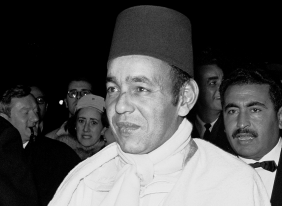
His Majesty King Hassan II
King Hassan II (9 July 1929 – 23 July 1999) was the King of Morocco from 1961 until his death in 1999.Hassan was educated at the Royal Academy in Rabat, where a class created for him was instructed by a faculty including Mehdi Ben Barka.[2] Hassan then earned a law degree from the University of Bordeaux.
- H.E Maurice Yameogo, 1st President of the Republic of Burkina Faso
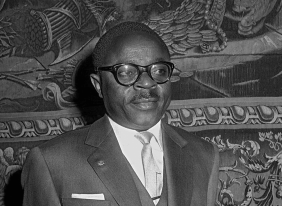
H.E Maurice Yameogo
His excellency Maurice Yaméogo (31 December 1921 – 15 September 1993) was the first President of the Republic of Upper Volta, now called Burkina Faso, from 1959 until 1966. On his return to his native town after the war, he was elected to the first territorial assembly of Côte d'Ivoire as the general councillor for Koudougou on 15 December 1946. Upper Volta had ceased to exist after 1932, being divided up between Côte d'Ivoire, French Sudan and Niger.
- H.E Philbert Tsiranana, 1st President of Madagascar
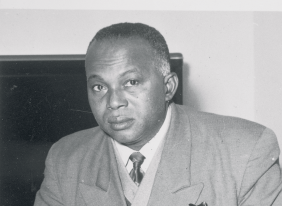
H.E Philbert Tsiranana
Philibert Tsiranana (18 October 1912 – 16 April 1978) was a Malagasy politician and leader, who served as the first President of Madagascar from 1959 to 1972. During the twelve years of his administration, the Republic of Madagascar experienced institutional stability that stood in contrast to the political turmoil many mainland African countries experienced in this period.
- Dr. William V.S. Tubman, 19th President of Liberia
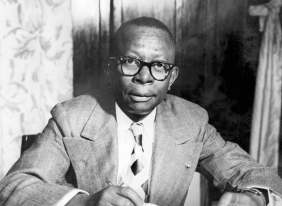
Dr. William V.S. Tubman
William Vacanarat Shadrach Tubman (November 29, 1895 – July 23, 1971) was a Liberian politician. He was the 19th President of Liberia and the longest-serving president in the country's history, serving from his election in 1944 until his death in 1971.During his tenure, Liberia experienced a period of prosperity. He also led a policy of national unification in order to reduce the social and political differences between his fellow Americo-Liberians and the indigenous Liberians.
- H.E Sylvanus Olympio, 1st President of the Republic of Togo
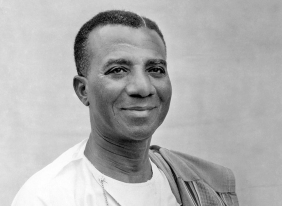
H.E Sylvanus Olympio
Sylvanus Épiphanio Olympio (6 September 1902 – 13 January 1963) was a Togolese politician who served as Prime Minister, and then President, of Togo from 1958 until his assassination in 1963.
- H.E Jomo Kenyatta , Prime Minister of Kenya (1963 to 1964)
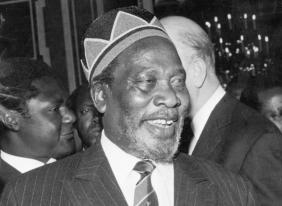
H.E Jomo Kenyatta
His excellency Jomo Kenyatta (c. 1897 – 22 August 1978) was an anti-colonial activist and politician who governed Kenya as its Prime Minister from 1963 to 1964 and then as its first President from 1964 to his death in 1978. Kenya became an independent state on 12 December 1963. He was the country's first president and played a significant role in the transformation of Kenya into an Independent Republic.
- Kenneth David Kaunda, 1st President of Zambia from 1964 to 1991
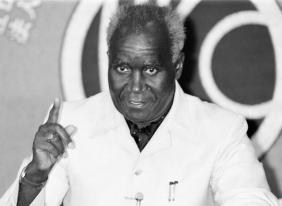
H.E Kenneth David Kaunda
Kenneth David Kaunda (28 April 1924 – 17 June 2021) served as the first President of Zambia from 1964 to 1991. He was at the forefront of the struggle for independence. Dissatisfied with Harry Nkumbula's leadership of the Northern Rhodesian African National Congress, he broke away and founded the Zambian African National Congress, later becoming the head of the socialist United National Independence Party (UNIP).
